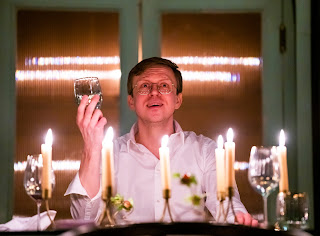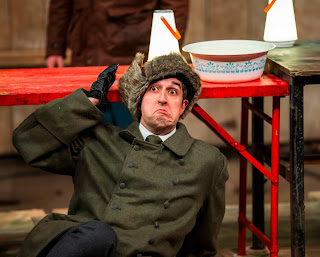Outside of this gimmick, there are a couple of other running themes to the evening, including food and drink: The first three acts take place around the dining table where the Sicilian royals are served endless courses, while the fourth takes us around a big rustic table where dodgy moonshine gets served at the sheep-shearing festival.
In fact, the production opens with the family and their guest eating with napkins draped over their heads, suggesting that they're eating Ortolan Bunting, and setting them up as not just a wealthy Royal family but a particularly decadent one. As Leontes succumbs to madness, he picks at dishes served in dry ice, steals people's desserts and eventually craves a burger from a van. Maybe this ease with which he can have anything he wants is suggested as an explanation for his famously unexplained change of personality: With nothing much to really worry about, maybe his midlife crisis turns his mind against himself and his family. Yes, it's all the Ortolan Bunting's fault.
Certainly his paranoia is clearly presented as a nervous breakdown which everyone around him acknowledges as such - it's hard not to when he starts to strip off and spends most of the play clambering over the table in his vest and pants. Keeping the entire opening story in the dining room makes it a more intimate, personal story, in which the household staff have to play along with his fantasy of putting Hermione on trial. Here it becomes just that, a delusion everyone improvises around, which all makes Leontes' actions more tragically caused by sudden mental illness, but with the trappings of an all-powerful, mad dictator kept offstage it does beg the question why nobody tries to at the very least help if not outright depose him, especially when playing his game has very real and deadly consequences.
I'm on record as not being a big fan of The Winter's Tale, especially these opening three acts, but while I can't say Holmes 'production changed my mind about the relentless persecution of Hermione and paranoid rantings from Leontes, playing it as an intimate psychological thriller certainly kept my interest a bit more than some of the past versions I've seen. There's even a slightly trippy feel, as if we're being sucked into Leontes' madness ourselves, in the way the play's notorious bear gets expanded into a more general symbol of death: A bear's head on a formally-dressed human body, it not only pursues Antigonus but also gently leads Mamillius off to his death as well.
During the interval, the audience are invited to choose a seat outdoors in the Globe, although very little of the action here takes place on the main stage. Mostly the festival is set in the Yard, where Leontes and Hermione's lost daughter Perdita (Jacoba Williams) has fallen for Polixenes' disguised son Florizel (Sarah Slimani giving him a slightly insufferable posh-boy attitude that helps bring a bit of life to another of Shakespeare's collection of rather dull, wet young lovers.) Although there's some funny moments from Gormley's Old Shepherd, Samuel Creasey's Young Shepherd and Ed Gaughan's Autolycus, the prevailing impression is less of the comedy than of the slightly chaotic festival.
Best served, after another short break and shepherding of the audience, is the return to the Swanamaker and to Sicilia, where Leontes has been atoning for his sins for 16 years. As well as the usual moments of complete darkness (when the magical "statue" is introduced) this final act is very dimly lit in general. I'm not generally a fan of things being underlit, but here it succeeds in bringing a real sense of atmosphere and heartbreak.
The production has cast a couple of important supporting characters younger than I've usually seen, with interesting results: Nadine Higgin's Paulina being far from a frail old lady, combined with Leontes' power being less emphasised, does take away some of the power of her standing up to him, although the fact that she's apparently made him spend the intervening time watching slide shows of his dead wife does feel characteristically relentless of her. Meanwhile Camillo is usually played as the ever-faithful retainer, first to Leontes then to Polixenes, but Beruce Khan particularly focuses on him as the pragmatic character whose loyalty only extends up to the point where his self-preservation kicks in.
As Winter's Tales go this is one of the better ones I've seen in terms of keeping me interested, even if it was never going to entirely win me over. Given the high concept staging, I was also pleased to see that the Globe were really on top of the practicalities of running things smoothly and not letting the evening drag on towards midnight (in fact tonight's production was that rarity that comes in slightly shorter than advertised.) Some of this is in the timing of the moves indoors to outdoors and back being done with military precision (the Bohemian ensemble are cast from a military acting company, maybe they gave them some tips,) and some from the way the show's been edited. Like his gravedigger, Gaughan's Autolycus largely dispenses with the actual Shakespeare text, which on the one hand means his peddler can entertain the crowd by telling them the plot of Breaking Bad, on the other means he can take a few shortcuts in getting the audience up to speed with the plot in time for the last train home. Quite a charming and different evening, it's good to see directorial flourish and practicalities not get in each other's way.
The Winter's Tale by William Shakespeare is booking in repertory until the 16th of April at the Sam Wanamaker Playhouse.
Running time: 3 hours 5 minutes including one full interval and a shorter pause.
Photo credit: Tristram Kenton.








No comments:
Post a Comment